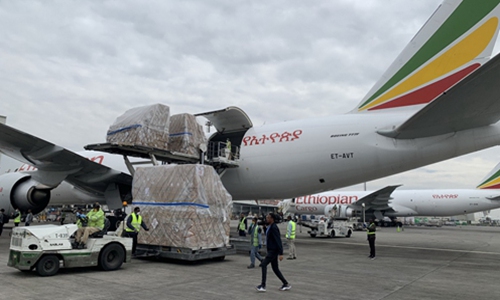Western media's futile attempt to drive China, Africa apart
Source:Global Times Published: 2020/4/17 18:17:22

An Ethiopian Airlines cargo flight filled with medical supplies donated to Africa from the Jack Ma Foundation and Alibaba Foundation arrives in Addis Ababa, Ethiopia, on March 22, 2020. Photo: Xinhua
Recent allegations that grassroot authorities in Guangzhou enforced discriminative quarantine measures against Africans residing in Guangzhou are absurd and nothing more than a malicious attempt to sow discord between China and African countries. China has implemented comprehensive epidemic prevention and control measures, which are applied to all groups, races and nationalities.China has entered into a new stage of epidemic prevention and control. It has brought the COVID-19 situation under control through arduous work. The economy, livelihoods, and production have gradually returned to normal. At the same time, it still faces daunting challenges to contain imported infections and prevent a second outbreak.
Under no circumstances will China take it lightly. It's imperative that Guangzhou, an economic hub that faces a higher risk of imported cases, implement strict quarantine measures.
One reason why China has succeeded in stemming the epidemic can be found in how the Chinese general public is willing to comply with prevention and control measures.
China has implemented comprehensive measures across the country that everyone must follow. What made it successful was society's cooperation and support. Those who breach prevention and control measures will be subject to punishment regardless of race or nationality.
Guangzhou has a large population of foreign nationals, and it is home to one of China's largest African communities. Africans living and working in Guangzhou indicate that the city is an ideal location to accommodate them.
Some Africans in Guangzhou need to readjust their way of thinking. They are not onlookers in the face of COVID-19. Guangzhou is their second home. As a part of the city, they need to respect and comply with prevention and control measures just like everyone else. Controlling pandemic is not only for the benefit of the locals but also for the expat communities, including Africans.
Recently, friction emerged between local grass-roots prevention and control personnel and some African nationals. There are multiple reasons, including cultural differences, different understanding of the pandemic, lack of knowledge about China's policies, language barriers, and misleading hype by some Western media outlets.
At this moment, mutual respect is particularly important. Chinese in African countries, including diplomats and businessmen, must respect and comply with local laws and customs, so should Africans in China.
Relevant Chinese authorities need to learn lessons from such experiences. They have to be more meticulous and considerate, take cultural differences into consideration, and enhance communication to avoid misunderstandings during virus prevention and control work.
In an attempt to incite hostility between China and Africa, Western media outlets made a big deal out of the alleged discrimination against Africans in Guangzhou. They fabricated "mistreatment of Africans in China," which triggered a diplomatic issue, marring China-Africa relations, and claimed that "China's racism is wrecking its success in Africa." Their attempt to drive a wedge between China and Africa is doomed to fail.
Misled by Western media's malicious hype, some Africans now have a misperception of what happened in Guangzhou. This is a temporary phenomenon. Those on the African continent don't know the exact actual situation, and misunderstandings will eventually be cleared up. In fact, China and Africa have recently engaged in active and effective communication efforts.
The recent events won't disrupt the overall picture of China-Africa relations, nor would it cause harm to China-Africa cooperation. When China was hit hard by the coronavirus outbreak, African countries and people offered their sympathy and support. As the pandemic continues to spread across the African continent, China is offering what it can to help its African partners.
Foreign Ministry spokesperson Zhao Lijian announced Wednesday that China is sending teams of medical experts to Ethiopia and Burkina Faso to help the two African countries fight the COVID-19 pandemic.
Africa is particularly vulnerable to the pandemic given its weak public health systems, and inadequate sanitation conditions. Enhancing China-Africa public health cooperation should be an important part of bilateral cooperation in the future. China should increase input to help strengthen the Africa Centers for Disease Control and Prevention, train African public health experts, and share experiences on epidemic prevention and control.
The article was compiled by Global Times reporter Yu Jincui based on an interview with Kuang Weilin, former Chinese ambassador to the African Union. yujincui@globaltimes.com.cn
Posted in: VIEWPOINT